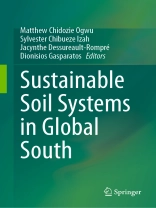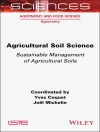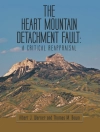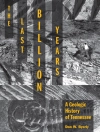With a focus on soil systems (status, properties, functionality, diagnosis, roles, assessment, conservation, knowledge, practices, productivity, management, policies, climate, biodiversity, etc.), this book addresses gaps pertinent to promoting sustainable human-environment in the Global South and beyond.
The soil system is a complex and dynamic part of the lithosphere with flows, inputs, storage, and output that connects it with other Earth systems. It is a living unit whose physical, chemical, and biological characteristics are dependent on the process of its formation, parent material, age, organic and inorganic constituent, and climate and relief. From a systems standpoint, balancing the relationship between utilization and management will help maintain soil health and the provision of ecosystem services. A healthy soil system is capable of functioning as a living unit to support other life and life processes and contribute to sustainable development in the Global South.
This book is of interest and useful to soil, biological and agricultural scientists, trainees and trainers, agricultural institutes, soil and food systems specialists, biodiversity and environmental managers, practitioners, activists, and students (especially undergraduates and postgraduates) in the Global South and beyond.
Daftar Isi
Part I. Soil Systems of the Global South.- Chapter 1. Soil Types, Formation Processes, and Characteristics in the Global South.- Chapter 2. Methods for assessing the physicochemical and biological properties of soil.- Chapter 3. Soil System Status and Issues in the Global South.- Chapter 4. Soil Utilization Patterns in the Global South.- Chapter 5. Soil Pollutants of Emerging Concern and Their One Health Implications.- Chapter 6. Urban Growth and land Use Change Impacts on Climate Change in Sub-Saharan Africa.- Chapter 7. Soil Systems and Agricultural Productivity for Food Security in the Global South.- Chapter 8. Contemporary Patterns in Soil Contamination and Environmental Sustainability in the Global South. Chapter 9. Emerging Soil Pollutants and their Implications on Biodiversity, Environmental, and Human Health.- Chapter 10. Threats to Soil Health and Productivity in the Global South.- Chapter 11. Soil Business: Exploring Business Opportunities in Soil Systems for Sustainable growth in the Global South.- Part II. Sustainable Management Strategies for Healthy Soil Systems in the Global South.- Chapter 12. Concepts and practices for managing soil health.- Chapter 13. Diagnosing Soil Health Through Ecological Risk Assessment in the Global South.- Chapter 14. Enhancing Soil Carbon Sequestration in the Global South – The Roles of Microbes and Biological Matter.- Chapter 15. Alternative Land Management Strategies and Their Impacts on Soil Conservation.- Chapter 16. Methods for Soil-Borne Disease Regulation from a Systems Perspective in Global South.- Chapter 17. Soil Conservation Approaches, Tools, and Techniques.- Chapter 18. Sustainable Alternative Land Management Strategies and Their Impacts on the Soil Arthropod Diversity.- Chapter 19. Climate Smart Soil Utilization and Management Systems in the Global South.- Chapter 20. Restoration of Soil Environment for Sustained Environmental and Public Health Security in the Global South.- Chapter 21. Advances in Soil Systems Remediation: Lessons from the Global North.- Chapter 22. Nutrient Budgets for Sustained Crop Production in African Soils: Evidence from Potato-Grown Soils in Tanzania.- Chapter 23. Enhancing Soil Health in Brazilian Agroecosystems: Indicators and Management Practices.- Chapter 24. Effects of Urbanization on Soil Quality in the Global South: The Case of Offa, Northcentral Nigeria.- Chapter 25. Soil System Status, Threats, Utilization Pattern and Sustainable Management Strategies in the Global South: Overview of the Agriculture soils in Maghreb Countries.- Chapter 26. Soil System Status, Threats, Utilization Pattern and Sustainable Management Strategies in the Global South: African Perspectives.
Tentang Penulis
Dr. Matthew Chidozie Ogwu
Dr. Matthew Chidozie Ogwu is an Assistant Professor of Integrated Ecology and Sustainable Development at Appalachian State University, USA. He is an interdisciplinary academic with transdisciplinary skills and diverse convergence research interests (One Health and Eco Health) pertinent to the assessment of coupled human and natural as well as socio-ecological systems and has numerous awards, research grants, and scholarships to his name. Dr. Ogwu serves on the board of and as a reviewer for many peer-reviewed journals. He continues to volunteer his time and skills to promote sustainable development.
Dr Sylvester Chibueze Izah
Dr. Sylvester Chibueze Izah is a lecturer at Bayelsa Medical University in Yenagoa, Nigeria, where he also serves as the Assistant Director of Academic Planning, Research, and Innovations. Dr. Izah is a licensed Environmental Health Specialist in Nigeria. He is a multidisciplinary academic with multifaceted abilities relevant to Sustainable Human-Environmental Health Interactions (covering air, soil, and water quality; toxicology; hygiene and sanitation; food science; waste management; biodiversity and their sustainability and risk assessment). He has an impressive track record of over 280 peer-reviewed publications, including journal articles, book chapters, and edited books. Dr. Izah has also collaborated on research projects with colleagues worldwide and actively contributes as an editorial and review board member for several esteemed journals.
Dr Jacynthe Dessureault-Rompré,
Dr. Jacynthe Dessureault-Rompré is a professor of soil conservation and health at Laval University, Canada. Dr. Dessureault-Rompré specializes in the conservation and restoration of cultivated peatland with a focus on carbon equilibrium through biomass production and soil amendment. Her scientific interests include soil conservation in general and that of cultivated peatland in particular, the soil-plant relationship and climate change, the optimization of N and C cycle in soils for sustainable agriculture and the regeneration of degraded soils using phytotechnology.
Dr Dionosios Gasparatos
Dr. Dionisios Gasparatos is an Associate Professor of Soil Science in the Laboratory of Soil Science and Agricultural Chemistry at the Agricultural University of Athens, Greece. His scientific interests are related to a wide variety of soil problems including genesis of redoximorphic features in saturated soils, amendment effects on potential toxic elements, integrated soil nutrient management practices, soil–plant relations, phosphorus dynamics, and key threats to soil resources. Dr. Gasparatos is a reviewer and editorial board member of several international journals as well as an editor of textbooks for graduate students.












